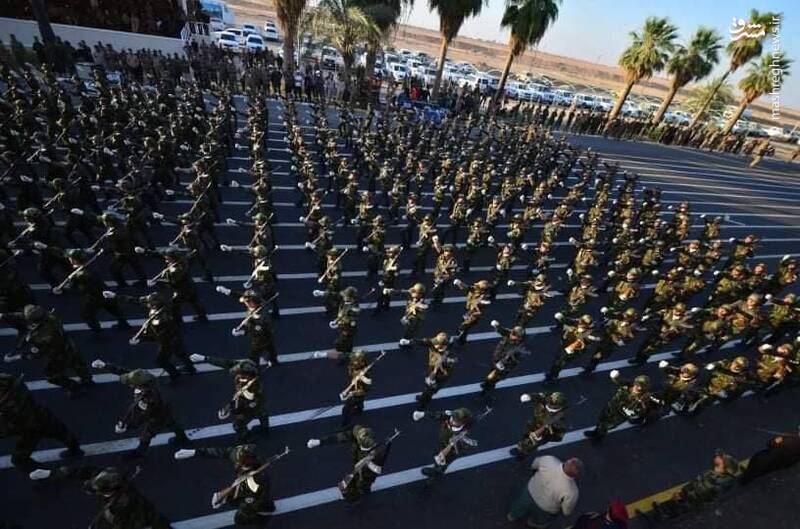Mohammad Baqer Sedaqat told the Strategic Council on Foreign Relations that the strategic Hashd al-Shabi march concurrent with the seventh anniversary of its establishment was an end to several years of conspiracy and deal to dissolve this important military force in Iraq.
He said after the defeat of Daesh in 2017, many efforts were made to dissolve Hashd al-Shabi or merge it into Iraq’s army but all such efforts failed.
Failure of the plots against Hashd al-Shabi
Referring to the protests organized as of mid-2019 with remarkable costs by some Persian Gulf states especially the United Arab Emirates in Iraq, he said such measures aimed at portraying a negative image of Hashd al-Shabi among the public opinion of Iraq and weaken its role in victories made against Daesh. However, these measures and plots failed due to the foresight and wisdom of Abu Mahdi al-Muhandis and emphasis on non-interference in those events.
This expert of Iraq issues said: “After these plots, we witnessed Hashd al-Shabi incidents in holy cities and some brigades attributed to the holy shrines had differences of opinion with other brigades of Hashd al-Shabi that were close ideologically to Iran decided to separate so as to dissolve Hashd al-Shabi. Now that these conspiracies have failed, the enemies of Hashd al-Shabi have become disappointed with reaching their goals.
Efforts to transform Hashd al-Shabi substantively
Sedaqat added that when such efforts and plots failed, the opponents of Hashd al-Shabi changed their approach from dissolution to substantive transformation as they are seeking to transform this resistance force to an ordinary military force so that it does not support the axis of resistance in the region.
This researcher of Mersad think-tank said they aim to inflict damage on Hashd al-Shabi’s main figures who are close to Iran and the resistance axis to as to transform their ideology.
Hashd al-Shabi march as a celebration of being independent force
He said the Iraqi army in terms of the number of ground forces and defensive and attack weapons had not been able to stage such a march by Hashd al-Shabi, adding that the Hashd al-Shabi march was a victory march against plots and conspiracies against it during the past several years.
“It was announced in the Hashd al-Shabi march that as mentioned by Martyr Abu Mahdi, Hashd al-Shabi is non-dissolvable and the enemies have accepted this reality. In fact, this march was the celebration of Hashd al-Shabi being an independent force in the future.”
Referring to the attacked by Americans to the Hashd al-Shabi positions which resulted in the martyrdom of four Iraqi forces and the emphasis of the Security and Defense Commission of Iraq’s Parliament on the necessity of implementing the bills approved by the parliament to evict foreign forces from Iraq if Americans repeat another hostile act, he said parliamentary factions supporting Hashd al-Shabi in Iraq own the majority of seats in the Iraqi parliament and can play a significant role in supporting this force.
Hashd al-Shabi; an indispensable part of Iraq’s future
He said Americans have reached this conclusion that Hashd al-Shabi is an indispensable part of Iraq’s future and its role is undeniable from the military and political viewpoint. For this reason, their approach to them has turned into converting the nature of Hashd al-Shabi.
This expert of Iraq affairs said Americans are trying to create a psychological war by such military attacks to prevent popularity of Hashd al-Shabi inside Iraq. The recent operation against the American forces and US logistical units alongside the Hashd al-Shabi march raised the popularity of Hashd al-Shabi therefore Americans wanted to change the atmosphere and make Hashd al-Shabi unpopular through military operation.
He said the Hashd al-Shabi march also resulted in the stabilization of forces in favor of the resistance movement in Iraq that could expedite the exit of American forces from Iraq and Syria in future, adding that in the political front, this march could create guarantees for more influence of Hashd al-Shabi-related figures in the Iraqi Parliament through ballot boxes.
Hashd al-Shabi; the only independent military forces in Arab countries
Sedaqat said on the strategic dimensions of Hashd al-Shabi march that Hashd al-Shabi is the only military force of an Arab country which is independent and non-reliant on Western countries and famous arms dealers and weapons companies.
“This issue is a guarantee for the future of Hashd al-Shabi. If other armies are one hundred percent dependent on arm-producing countries and especially the Westerners for their survival, Hashd al-Shabi is enjoying the backing of a big human force logistically. In terms of weapons and arms, Hashd al-Shabi has demonstrated that it is not in need of any large producer and exporter of weapons.”










0 Comments